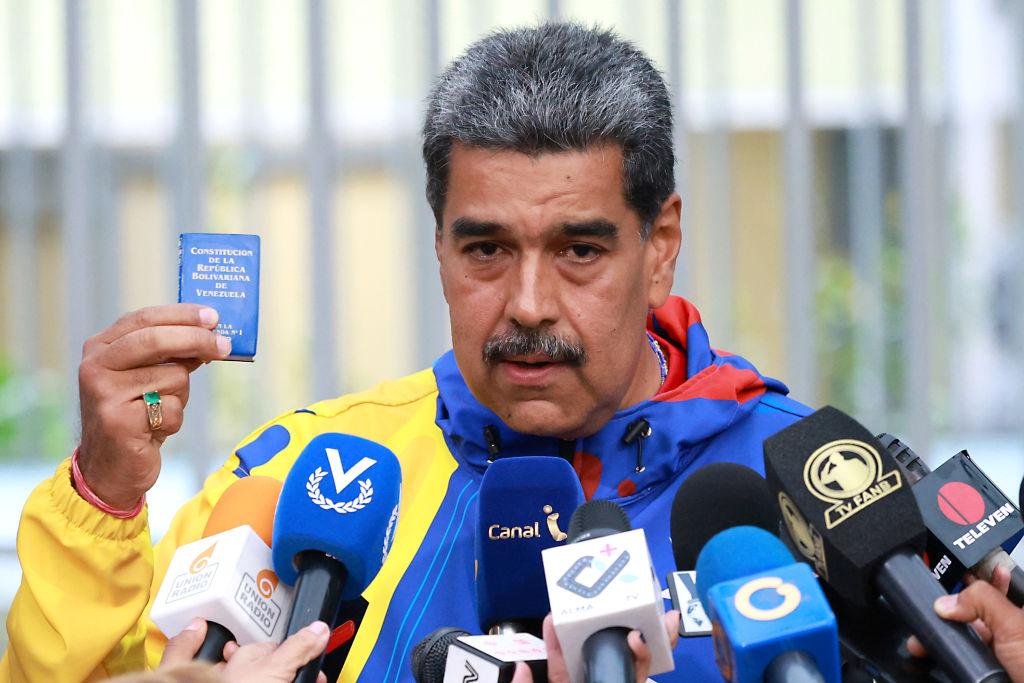Venezuela’s electoral authority, controlled by the ruling regime, said Nicolás Maduro was reelected as the nation’s president for six more years, setting off what is likely to be a clash with opposition parties who believed their massive turnout drive would result in victory.
Maduro won Sunday’s election with 51.2% of the vote, compared with 44.2% for rival Edmundo González, the electoral center said. An exit poll conducted by U.S. firm Edison Research instead had González winning by more than 30 percentage points, lending to suspicions that Maduro’s administration had tampered with the tally.
[time-brightcove not-tgx=”true”]
González had held off from discussing results until the elections agency weighed in. But he was expected to have his own tally with help from a network of roughly 30,000 volunteer witnesses at polling centers across the country. Late Sunday, minutes before the official tally was announced, opposition leaders said they’d only received access to 30% of the nation’s voting tabulations, which were supposed to be provided so they could verify the vote.
Read More: Midway Through the Ultimate Election Year: How the World Has Voted So Far
Maduro will face the challenge of legitimizing the vote to his people and the rest of the world, given his government’s history of repression and fraudulent elections. González was running in the place of María Corina Machado, who experienced a meteoric rise in popularity even after the government banned her from seeking public office.
Supporters of both candidates crowded polling centers late Sunday to bear witness to the counting process. Multitudes also gathered in front of the presidential compound, known as Miraflores, to enjoy concerts and rousing speeches from party officials. Both the administration and the opposition urged people to keep the peace after an election day that had been largely devoid of violence.
If the opposition disputes the official count as expected, the situation is likely to remain tense for days. Venezuela’s military leadership, which has long backed Maduro but can act independently, could choose to intervene in some way. International pressure from allies including Brazil and Colombia might also play a role.
A small mission of observers from the Carter Center is expected to release preliminary findings on Tuesday. A similar mission from the United Nations is observing the vote, but as is tradition, will not present their findings to the public. Venezuela withdrew the invitation to observe the vote from a more robust European Union group.
González and Machado had sought to dismantle government controls on the economy, privatize the oil industry and reunite families torn apart by the exodus of 7.7 million Venezuelans.
Maduro’s third consecutive term, if it starts as planned in January 2025, would be a challenging one.
After the economic crisis that stretched from 2013 to 2020, the president has led a remarkable transition away from his late predecessor Hugo Chávez’s policies, easing restrictions on businesses, price controls and regulations, and most significantly, allowing the U.S. dollar to circulate legally. He has withstood crippling U.S. sanctions meant to weaken his government, and prevailed over Juan Guaidó, who sought to unseat him after being recognized in 2019 as the legitimate president of Venezuela by the US and dozens of allied nations.
Now, he will have to navigate a path to growth for the still-ailing $102 billion economy, find a way toward sanctions relief and negotiate a $158 billion debt restructuring.
Any questions of the legitimacy of his electoral victory, however, would make it difficult for Maduro to be recognized internationally as the country’s president and secure much-needed sanctions relief.

